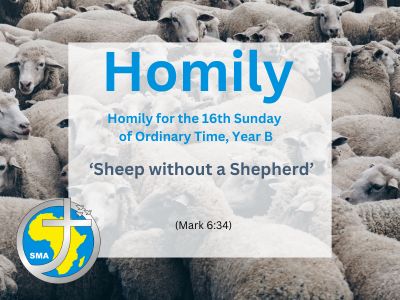Readings: Jeremiah 23:1-6; Ephesians 2:13-18; Mark 6:30-34
Theme: ‘Sheep without a Shepherd’ (Mark 6:34)
Being compared to sheep – lost or found – may seem quite unflattering to most people today. Yet, the pages of the bible are strewn with references to sheep and shepherding. In the Hebrew Bible, the shepherd’s care for his sheep is one of the most common metaphors for God’s love and concern for his chosen people. A good example is today’s responsorial psalm: ‘The Lord is my Shepherd, there is nothing I shall want’ (Psalm 23) In the New Testament, Jesus, through whom, as the second reading reminds us we have ‘our way to come to the Father’ (Eph 2:18) speaks of himself as ‘the good shepherd’ who ‘lays down his life for his sheep’ (Jn 10:11). The theme of sheep and shepherding is the main focus of today’s readings.
In the first reading, the prophet Jeremiah, pulls no punches in condemning the leaders (kings) of Israel for the poor quality of their leadership. He calls them ‘wretched shepherds who allow the flock of my [God’s] sheepfold to be destroyed and scattered’ (Jer 23:1). Jeremiah is referring to the kings of Judah who lived in the late 7th and early 6th centuries BC, leaders notorious for their indifference to the welfare of the people, who allowed injustice, inequity and oppression to flourish instead of justice and integrity. These leaders were more concerned with protecting their power and feathering ‘their own nest’ than with protecting and caring for the people they were appointed to serve – sadly, an all too prominent failing among leaders throughout human history, down to the present day. Yet, as Jeremiah teaches, God’s loving concern for his people remains constant. He himself will become their shepherd, ‘bringing them back to their pastures’ (Jer 23:3). He will raise up a virtuous branch for David ‘who will reign as true king and be wise, practicing honesty and integrity in the land’ (Jer 23:5). This prophesy refers to Jesus, the Good Shepherd par excellence.
Today’s gospel reading from Mark underlines the caring and compassionate qualities of Jesus’ shepherding. The reading begins with Jesus, after a rather hectic day of ‘coming and going’, retreating with his closest companions to a lonely place to rest a while (cf. Mk 6:31). However, their respite is short lived as, on arrival at their destination, they are met by a large crowd of people. Jesus reacts not with annoyance but with compassion. In the words of Mark: ‘As he stepped ashore he saw a large crowd; and his heart was moved with pity for them, for they were like sheep without a shepherd’ (Mk 6:34). The word pity is too weak to express the depth of Jesus’ feeling for the crowds who sought him out. The Greek word Mark employs (splagchna) refers to a ‘gut level’ response and is best conveyed by the English word ‘compassion’. Jesus is deeply moved by the plight of the crowd, and he takes the time ‘to teach them at some length’ (Mk 6:34). The example of Jesus in this instance is nó excuse for lengthy sermons!
Teaching was only one part of Jesus ministry which was preeminently a ministry of compassionate outreach to people, especially to ‘the lost sheep of the house of Israel’ (Mt 10:6). In contrast to the way we often behave, Jesus’ approach to people was never moralistic. At the very heart of his ministry and was a concern for their integral well-being. To quote the stirring words of the noted Scripture scholar, N.T. Wright: ‘In Jesus we see the biblical portrait of God come to life: the loving God, rolling up his sleeves to do in person the job that no one else could do, the Creator God giving new life; … the faithful God dwelling in the midst of his people; the stern and tender God relentlessly opposed to all that destroys or distorts the good creation, and especially human beings, but recklessly loving all those in need and distress’.
As disciples of Jesus, called to be his witnesses in the world of time, we must imitate the compassionate shepherding of Jesus. While people may not like to be regarded as ‘sheep without a shepherd’, there are in fact many people in our world, and even within the Church, who feel lost and alienated. An essential dimension of our mission as Christians, as the Body of Christ, is to reach out to the uprooted, homeless people of our time, and help to create a safe space where they are accepted and feel at home. In this way we can continue the shepherding ministry of Jesus, and help to bring healing and peace for our broken world. I conclude with a sonnet by Malcolm Guite on the theme of shepherding.
When so much shepherding has gone so wrong,
So many pastors hopelessly astray,
The weak so often preyed on by the strong,
So many bruised and broken on the way,
The very name of shepherd seems besmeared,
The fold and flock themselves are torn in half,
The lambs we left to face all we have feared
Are caught between the wasters and the wolf.
Good Shepherd now your flock has need of you,
One finds the fold and ninety-nine are lost
Out in the darkness and the icy dew,
And no one knows how long this night will last.
Restore us; call us back to you by name,
And by your life laid down, redeem our shame.
Click on the play button below to listen to an alternative homily from Fr Tom Casey SMA.

